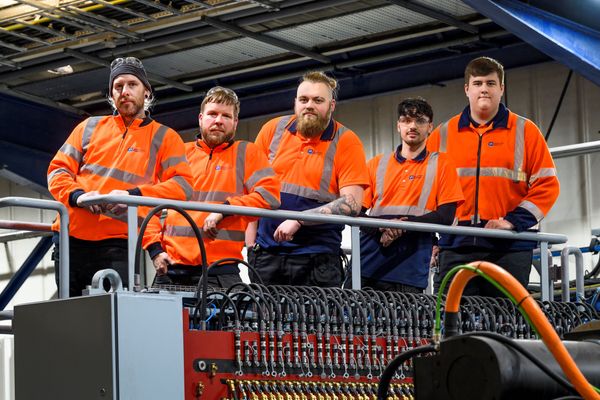Brighouse welded mesh manufacturer launches bespoke training programme





Welded steel mesh manufacturer Siddall and Hilton Products is celebrating the success of a new, bespoke training programme it has developed as part of its ongoing recruitment drive. With six new starters having already joined the long-established business since January, it is currently looking for another three people to train as mesh operators.
The Brighouse-based company, which is the UK’s largest manufacturer of welded steel mesh for high-security fencing, general fencing and industrial mesh panels, has seen strong growth over the last couple of years. As well as recently announcing a £2m investment in a specialist welding machine to increase capacity and efficiency, it is also continuing to expand and develop its 55 plus-strong team.
Ian Thurley, chief executive, explains: “In the past, we’ve looked at developing our people through engineering apprenticeships and college courses, but off-the-shelf training is simply not relevant given the specialist nature of our work. With the business continuing to grow, we realised that we needed to devise our own training programme, designed to equip someone new to the industry with the skills to run one of our sophisticated machines within around six months.
“One of our most experienced mesh operators, Nick Brown, took on the role of in-house training expert and has developed a training programme for each of our four active machines. Working with just one or two new recruits at a time, he takes them through an eight-week long structured and supported induction process, covering every aspect of this complex kit before they pass on to shift. After only three months, we are already seeing some of our ‘longer-serving’ joiners able to run a machine with supervision and progressing well on shift, demonstrating the benefits of this new initiative.”
One of the trainees, Richard Haigh of Heckmondwike who joined Siddall and Hilton in January having previously worked in warehousing, said: “The job appealed to me as it sounded a bit different, so I thought I’d give it a go. It’s actually really good – the training went well, with every button being explained to me before I started working on my own. It’s challenging, but I really enjoy it and I’ve had lots of positive feedback. It’s the first job I’ve had where there’s scope to progress; having been trained on one machine, I’m now being encouraged to learn another. It’s the sort of company where if you’re a good worker and you want to learn, they will support you.”
Nick Brown, technical trainer, who was formerly a fuel injection engineer and has been a mesh operator for almost five years, adds: “It’s been interesting to put the programme to the test with our first intake which comprised people from a broad mix of backgrounds, most without any previous relevant experience. We’ve been able to take them all through this comprehensive learning process and quickly get them up to speed.
“Given the size and complexity of our machines, there’s a lot to learn, but it’s a genuinely interesting job – this type of work is very hands-on and varied; you get involved in setting up the machine, stopping it, repairing it and so on. The training itself is still being fine-tuned as we go along, and we’re looking forward to welcoming another two or three mesh operators in the coming months.”
Joshua Falkiner from Leeds started training as a mesh operator in early March having previously worked in hospitality. He comments: “I see this job as a chance to better myself and gain valuable skills. The training has been absolutely amazing, with lots of support while I get used to the machine. I’m really enjoying being in a different environment and learning something new every day; it’s also good to be part of a team where you feel your role is really useful. I’m being very well looked after and love what I’m doing – I see my future and my career as being here, if I stayed here the rest of my life, I’d be happy.”
Ian Thurley concludes: “As well as providing the skilled operators we need to drive the business forward today, this initiative is also about encouraging people with potential to embark on long-term careers with us. We see this type of role as an entry point to the company, but then want to help those individuals who show aptitude to build their careers and rise through the ranks, ultimately into management. Home grown leaders are an essential part of ensuring we have the right mix of knowledge and experience in the leadership team of the future. It’s vital that we nurture manufacturing skills for the future, we want to support employees’ progress through the business and, ultimately, enable them play a part in its continued success and development.”